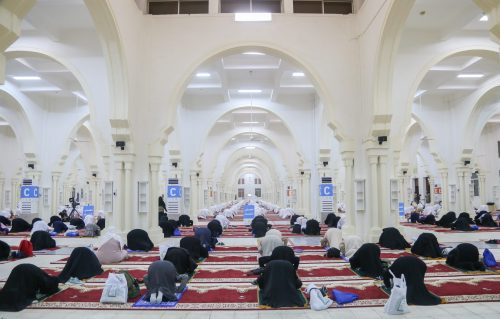 “I abducted your girls. I will sell them in the market, by Allah,” “There is a market for selling humans. Allah says I should sell. He commands me to sell. I will sell women. I sell women,” –Abubakar Shekau -[i]
“I abducted your girls. I will sell them in the market, by Allah,” “There is a market for selling humans. Allah says I should sell. He commands me to sell. I will sell women. I sell women,” –Abubakar Shekau -[i]
The recent abduction of over two hundred girls in Government Girls College, Chibok, Borno State, Nigeria has raised huge cries and condemnation around the world. The girls sitting for the Senior School Certificate Examinations (SSCE) were abducted by the ruthless Islamic Militant group, Boko Haram, roughly translating in Hausa to “Western Education is Sin”. The sect is against all form of westernization, secularism, western education and democracy.
The abduction of the Chibok girls has raised the menace of the insurgency into international limelight, a blessing for Nigerians mostly suffering from one form of slavery or the other. The opportunity afforded by the hashtag #BringBackOurGirls is one, the Nigerian government, civil society, development partners’ et al should tap into to bring an end to slavery in the country and in West Africa.
Taking a cue from the words of the leader of Boko Haram ; “I will sell them in the market, there is a market for selling humans, I will sell women and I sell woman” The critical question to ask within the Nigerian context is, what is new in what Shekau is planning to do and what forms of slavery are being practiced in other parts of the country albeit covertly?
Starting with the Boko Haram insurgency, it is been in the news that the Islamic sect have been kidnapping girls in the states of Borno, Yobe for some time now, reports hav it that insurgents strategies in kidnapping these girls vary, at times they are kidnapped on their way to farm, on the streets or right in their houses and married off, reports even have it that the sect at times allegedly drop N5,000 (about US $31 ) as Mahr as prescribed under Islamic law in front of such houses signifying in their own minds that these girls are lawfully married to them, only for them to be used as sex slaves in their camps. A statement issued by Human Rights Watch in November 2013 confirms these abductions, according to the group, most of the rescued women and girls from the insurgents’ camp either returned with babies or pregnant[ii]. Reports from such girls that escaped from the Islamist camps are abound in the media, yet there is deafening silence from all actors both state and non-state.
Probably, the absence of public outcry is normal as the country suffers from varying forms of slavery. An anti-slavery research conducted alongside Timidria in Niger Republic traced over seventy slaves sold as wahaya into Nigeria. Largely undocumented and prevalent in Northern Nigeria with near total silence of the state and stakeholders, Wahaya or the fifth wife syndrome are girls and women bought and exploited as property by many dignitaries’ mostly wealthy men or religious leaders. The women are used for free labour and for the sexual gratification of their masters, who assault them at will, when they are not with their legitimate wives[iii].
The baby factory also known as child harvesting is a new phenomenon in Nigeria’ slavery regime. It takes different dimensions, one, young girls between the ages of 13- 25years are forced to conceive, give birth and the babies given out, secondly, Pregnant teenagers are lured into these baby factories and detained until they give birth and thirdly as a result of poverty, some voluntarily acquiesce to either trade their babies after birth or agree to be impregnated by in-house studs in these baby factories and relinquish the baby for as low as N100,000 (approximately US$617). These babies are sold into the illegal/ unregulated adoption market or sold to herbalists for rituals[iv]. These factories are peculiar to the South Eastern Part of the country but becoming prevalent in other parts of the country. Yet what has remained challenging so far as being the prosecution of proprietors of these baby factories. For instance, Dr. Oranika, proprietor of the Cross Foundation arrested in 2007 was acquitted by the court for lack of evidence and has been re-arrested in another location in 2011[v]. Yet these baby harvest farms are alleged to be an illegal outlet for harvesting organs for voodoo practices while organ harvesting is not covered by the definition of trafficking in the NAPTIP Act[vi].
Yet the entire focus of the Nigerian government and the National Agency for the Prohibition of Traffic in Persons and Other Related Matters (NAPTIP) have been sex trafficking and maybe child labour, a feat they have recorded considerable success in combating. Nigeria is a source[vii], transit[viii], and destination[ix] country for trafficked person especially women and children. Nigerians are trafficked to Europe, the Middle East, and other countries in Africa for the purposes of forced labor, domestic servitude, and sexual exploitation. Nigerian girls and women are trafficked for forced prostitution to Italy, France, Spain, the Netherlands, Cote d’Ivoire, Mali and South Africa. Traditionally, sex trafficking has been viewed as an exclusive domain of women and girls; however, an evolving pattern is beginning to show the commercial exploitation of boys and men[x].
Part of the challenges militating against the successful prevention and prosecution of trafficking in Nigeria is the legal framework, while the UN Protocol to Prevent, Suppress and Punish Trafficking in Persons, especially Women and Children[xi] defines “Trafficking in persons” as the “recruitment, transportation, transfer, harboring or receipt of persons, by means of the threat or use of force or other forms of coercion, of abduction, of fraud, of deception, of the abuse of power or of a position of vulnerability, or of the giving or receiving of payments or benefits to achieve the consent of a person having control over another person, for the purpose of exploitation[xii]. Exploitation shall include, at a minimum, the exploitation of the prostitution of others or other forms of sexual exploitation, forced labor or services, slavery or practices similar to slavery, servitude or the removal of organs.” While Nigeria’s definition of trafficking aligns with the Palermo protocol, it excludes organ trafficking in its definition of trafficking, especially as many people are alleged trafficked for organ removal for ritual purpose. Also of note is the new form of trafficking such as baby factories, the exclusion in the definition leaves the NAPTIP confused about the approach to adopt. There is a strong need for context specific adoption of definition of trafficking in persons, a challenge already picked up by NAPTIT in the ongoing amendment process of the NAPTIP Act in the National Assembly.
However, corruption is also an enabling factor in the Nigerian trafficking industry. In sending countries, large-scale operations require the collaboration of officials to obtain travel documents[xiii] and secure the exit of victims outside the country and in transit. Similarly, the operation of brothels depends on the collaboration of officials and police[xiv] who would be willing to ignore or work with the traffickers. In 2001, a former police officer and 50 other Nigerians were arrested in Conakry by Guinean authorities. According to the Nigerian ambassador to Guinea, Abdulkadir Sani, of the 51 detainees, 33 were young women between the ages of 18 and 20, while 17 others were men suspected of being behind the trafficking of the girls. The report disclosed that 95 per cent of those being held were from Benin, Edo State and that the former police officer among them used to work for the Benin police command. Fake Guinean passport booklets, fake flight tickets, and American dollars were recovered from the 17 suspected traffickers. While the link between procurers of victims within Nigeria and their external collaborators has not been properly established, it has been revealed that the Nigerian Police, instead of counseling and enhancing the rehabilitation of the victims, further aggravate the predicament of these women by subjecting them to persecution and extortion while they are in holding cells. Thus the role of the border patrols, immigration officials, customs and police as exploiters in the trafficking business need to be further explored and findings amplified to the public.
The #BringBackOurGirls campaign is a welcome and an opportunity for both state and non-state actors to rally around the pervasive slavery prevalent in the Nigerian state, this is not just about bringing back the Chibok girls which remains a huge priority in the heart of all Nigerians and the world but opportunity to rescue the girls kidnapped from Benisheik, on the streets and the farms by the Boko Haram insurgents. It is also a wakeup call to the Nigerian government to end all forms of contemporary slavery from the baby factories, forced labour, organ trafficking, sex trafficking etc.
Idayat Hassan
[i] Nigeria girls ‘shown’ in Boko Haram video – BBC News https://www.youtube.com/watch?v=DsxGjAsOaNg
[ii] Boko Haram abducts women, recruits children, says HRW http://weeklytrust.com.ng/index.php/new-news/14871-boko-haram-abducts-women-recruits-children-says-hrw accessed 17th May 2014
[iii] Wahaya, domestic and Sexual Slavery in Niger, a report by Galy Kadir Abdelkader and Moussa Zangaou. The Wahayu is obtained by means of cross-border trackficking from the Tahoua region of Niger.
[iv] Recently the Nigerian police rescued several pregnant teenage girls who were incarcerated in a hospital in Abia State. It was established that the young mothers are confined throughout pregnancy and on delivery the newborn babies’ particularly male babies are sold to native doctors for sacrificial purposes while putting others in the unregistered adoption markets. http://globantihumantraffickwatch.blogspot.com/2011/06/nigeria-baby-farm-girls-rescued-by-abia.html, www.bbc.co.uk/news/world-africa-13622679 accessed on January 29th, 2012
[v] How child trafficking network operates in South East, Vanguard, June 30th, 2011
[vi] Exposed: Ritualist den in Ogun State, www.nationalstandardnewspaper.com
[vii] Trafficking of women in Nigeria is predominantly to Italy, Spain, Belgium, Netherlands, United States of America and South Africa are destination countries. Reports for Advocacy project reports that Nigerian women make up 70% of the 70,000 African victims of trafficking, www.advocacynet.org, see also www.unicef-icdc.org/cgi-bin/unicef
[viii] Women and children are trafficked from Cameroon, Equatorial Guinea through Nigeria to destinations.
[ix] Nigeria is also a destination country for trafficked persons from Ghana, Togo and Benin, US TIP report 2011
[x] There is a high incidence of boys trafficked for sexual exploitation in Ghana and Gambia Sex Tourism Industries see Ghana CEDAW Report 2004-06, ECPAT Report 2008
[xi] Otherwise referred to as The Palermo Convention and Protocol, 2000
[xii] While Nigeria definition of trafficking aligns with the Palermo protocol, it excludes organ trafficking in its definition of trafficking, especially as many people are alleged trafficked for organ removal for ritual purposes.
[xiii] An Edo chief was arrested on the suspicion of trafficking at the Murtala Muhammad International Airport in Lagos with two girls who he claimed were his assistants. He was travelling on a diplomatic passport normally available to high ranking government officials, June 9, 2010 234next.com/csp/cms/sites/Next/News/5577520…/story.csp accessed on 6th February, 2012.
[xiv] In Nigeria and Mali, Police men extort money from the prostitutes or collaborate with them to extort money from the patrons. See Tears at Christmas, the Golden girls of Mali at http://asafeworldforwomen.org/trafficking/trafficking-in-mali/483-the-golden-girls-of-mali.html accessed on 29th January, 2012



